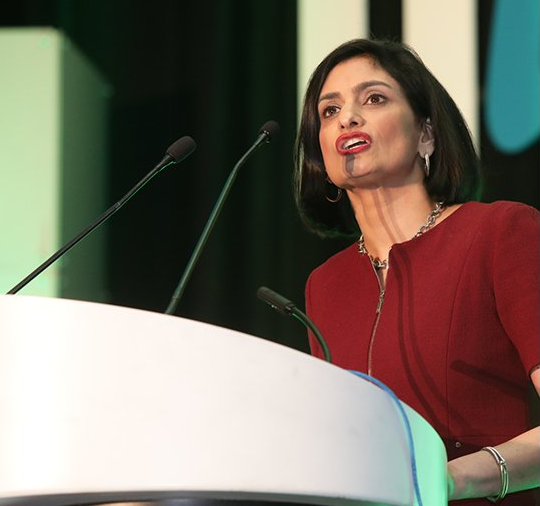 PatientPoint®, the trusted leader of patient and physician engagement solutions across all points of care, today announced a collaboration with national addiction prevention, treatment and recovery nonprofit Shatterproof to place opioid education in nearly 25,000 physician offices across the country. This program, the first national point-of-care initiative of its kind, will reach an estimated 15 million patients and caregivers each month and up to 200 million annually.
PatientPoint®, the trusted leader of patient and physician engagement solutions across all points of care, today announced a collaboration with national addiction prevention, treatment and recovery nonprofit Shatterproof to place opioid education in nearly 25,000 physician offices across the country. This program, the first national point-of-care initiative of its kind, will reach an estimated 15 million patients and caregivers each month and up to 200 million annually.
 The Department of Health and Human Services (HHS) announced the availability of $195 million in a new funding opportunity for community health centers to expand access to mental health and substance abuse services focusing on the treatment, prevention and awareness of opioid abuse in all U.S. states, territories and the District of Columbia. The awards are expected to be made in September of this year. Health centers that receive an award will use the funds to increase the number of personnel dedicated to mental health and substance abuse services and to leverage health information technology and training to support the expansion of mental health and substance abuse services and their integration into primary care.
The Department of Health and Human Services (HHS) announced the availability of $195 million in a new funding opportunity for community health centers to expand access to mental health and substance abuse services focusing on the treatment, prevention and awareness of opioid abuse in all U.S. states, territories and the District of Columbia. The awards are expected to be made in September of this year. Health centers that receive an award will use the funds to increase the number of personnel dedicated to mental health and substance abuse services and to leverage health information technology and training to support the expansion of mental health and substance abuse services and their integration into primary care.

 I’ve always been struck by how seldom the patient is mentioned in discussions around value-based care. Let me be clear, we will not achieve value-based care until we put the patient at the center of our healthcare system. Until patients can make their own decisions based on quality and value health care costs will continue to grow at an unsustainable rate. This administration is dedicated to putting patients first, to be empowered consumers of health care that have the information they need to be engaged and active decision-makers in their care. Through this empowerment, there will be a competitive advantage for providers that deliver coordinated, quality care, at the best value, to attract patients who are shopping for value.
I’ve always been struck by how seldom the patient is mentioned in discussions around value-based care. Let me be clear, we will not achieve value-based care until we put the patient at the center of our healthcare system. Until patients can make their own decisions based on quality and value health care costs will continue to grow at an unsustainable rate. This administration is dedicated to putting patients first, to be empowered consumers of health care that have the information they need to be engaged and active decision-makers in their care. Through this empowerment, there will be a competitive advantage for providers that deliver coordinated, quality care, at the best value, to attract patients who are shopping for value. Today, I want to submit to you that only Trump can make single-payer health care happen in this country. Only a billionaire, surrounded by a cabinet of billionaires, representing a party partial to billionaires, can make that hazardous 180 degrees political turn and better the lives of the American people, and perhaps the entire world as a result. Oh, I know it’s too soon to make this observation, but note that both Mr. Nixon and Mr. Begin were deeply resented (to put it mildly) in their times, by the same type of people who find Mr. Trump distasteful today.
Today, I want to submit to you that only Trump can make single-payer health care happen in this country. Only a billionaire, surrounded by a cabinet of billionaires, representing a party partial to billionaires, can make that hazardous 180 degrees political turn and better the lives of the American people, and perhaps the entire world as a result. Oh, I know it’s too soon to make this observation, but note that both Mr. Nixon and Mr. Begin were deeply resented (to put it mildly) in their times, by the same type of people who find Mr. Trump distasteful today. The Health Resources and Services Administration (HRSA) is taking major steps to help Community Health Centers across the US tackle the devastating opioid epidemic by providing funding for substance abuse services and modern EHRs. OpenEMR, a modern, customizable, open-source and ONC Certified EHR is the best solution for high impact and cost-effective information technology solutions for Community Health Centers
The Health Resources and Services Administration (HRSA) is taking major steps to help Community Health Centers across the US tackle the devastating opioid epidemic by providing funding for substance abuse services and modern EHRs. OpenEMR, a modern, customizable, open-source and ONC Certified EHR is the best solution for high impact and cost-effective information technology solutions for Community Health Centers When public health is threatened by an outbreak of SARS or Zika or avian influenza, widely disseminated information becomes a crucial tool used to curtail the spread of disease. But transmittable diseases are not the lone threats to public health. Other metaphorically pathogenic events—the current opioid epidemic, for example—are more effectively managed by making sure doctors have complete information when evaluating patients and, especially, writing prescriptions.
When public health is threatened by an outbreak of SARS or Zika or avian influenza, widely disseminated information becomes a crucial tool used to curtail the spread of disease. But transmittable diseases are not the lone threats to public health. Other metaphorically pathogenic events—the current opioid epidemic, for example—are more effectively managed by making sure doctors have complete information when evaluating patients and, especially, writing prescriptions. Rep. Jason Chaffetz's recent remarks suggesting that some Americans should invest in their health instead of in a new iPhone reminded me of nothing so much of the old Jack Benny bit, where Benny is accosted by a robber who threatens "your money or your life." When Benny doesn't immediately respond, the robber prompts him, and the supposedly miserly Benny snaps back, "I'm thinking it over." I suspect that, like Mr. Benny, many of us would have a tough choice between our smartphones (and our other devices) and our health. It may be not so that we're miserly as it is that we're addicted.
Rep. Jason Chaffetz's recent remarks suggesting that some Americans should invest in their health instead of in a new iPhone reminded me of nothing so much of the old Jack Benny bit, where Benny is accosted by a robber who threatens "your money or your life." When Benny doesn't immediately respond, the robber prompts him, and the supposedly miserly Benny snaps back, "I'm thinking it over." I suspect that, like Mr. Benny, many of us would have a tough choice between our smartphones (and our other devices) and our health. It may be not so that we're miserly as it is that we're addicted.